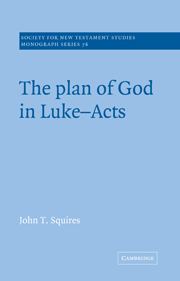Book contents
- Frontmatter
- Contents
- Acknowledgements
- List of abbreviations
- 1 The plan of God in Luke–Acts
- 2 The Programmatic role of providence in hellenistic historiography
- 3 Providence: God at work in human history
- 4 Portents: signs of divine action in human history
- 5 Epiphanies: inspired indications of the plan of God
- 6 Prophecy: foretelling and fulfilling the plan of God
- 7 Fate: the necessity of the plan of God
- 8 Conclusions
- A select bibliography
- Index of Greek words
- Index of subjects and authors
- Index of biblical references
2 - The Programmatic role of providence in hellenistic historiography
Published online by Cambridge University Press: 22 September 2009
- Frontmatter
- Contents
- Acknowledgements
- List of abbreviations
- 1 The plan of God in Luke–Acts
- 2 The Programmatic role of providence in hellenistic historiography
- 3 Providence: God at work in human history
- 4 Portents: signs of divine action in human history
- 5 Epiphanies: inspired indications of the plan of God
- 6 Prophecy: foretelling and fulfilling the plan of God
- 7 Fate: the necessity of the plan of God
- 8 Conclusions
- A select bibliography
- Index of Greek words
- Index of subjects and authors
- Index of biblical references
Summary
The histories of Diodorus Siculus and Dionysius of Halicarnassus
‘It is fitting that all men should ever accord great gratitude to those writers who have composed universal histories’, writes Diodorus Siculus in the latter years of the first century BCE, as he commences his own mammoth attempt at a universal history, the Bibliotheke Historike.
Such historians have therein shown themselves to be, as it were, ministers of divine providence (ὑπουργοὶ τη̂ς θείας προνοίας), for just as providence, having brought the orderly arrangement of the visible stars and the natures of men together into one common relationship, continually directs their courses through all eternity, apportioning to each that which falls to it by the direction of fate (ἐκ τη̂ς πεπρωμένης μερίζουσα), so likewise the historians … have made of their treatises a single reckoning of past events and a common clearing-house of knowledge concerning them.
(BH 1.1.3)Diodorus thus envisions the ideal historical work as one in which the historian's ordering of disparate events into one account is comparable to the way that providence orders the elements of the cosmos into one scheme. In practice, however,
when we turned our attention to the historians before our time, although we approved their purpose without reservation, yet we were far from feeling that their treatises had been composed so as to contribute to human welfare as much as might have been the case. For although the profit which history affords its readers lies in its embracing a vast number and variety of circumstances, yet most writers have recorded no more than isolated wars waged by a single nation or a single state, and but few have undertaken … to record the events connected with all peoples.
(BH 1.3.1–2)- Type
- Chapter
- Information
- The Plan of God in Luke-Acts , pp. 15 - 36Publisher: Cambridge University PressPrint publication year: 1993



